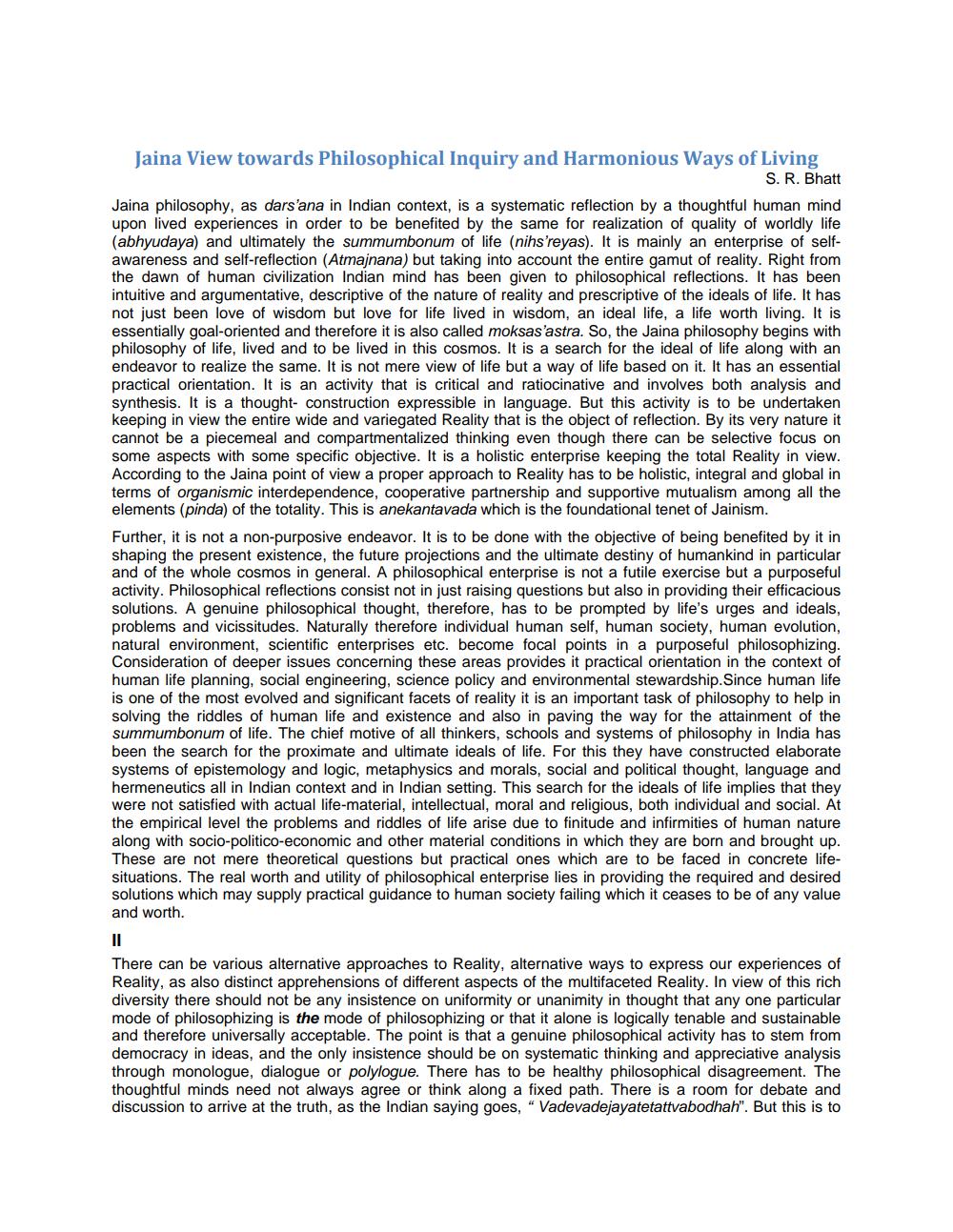Book Title: Jaina View Towards Philosophical Inquiry and Harmonious Ways of Living Author(s): S R Bhatt Publisher: ZZZ Unknown View full book textPage 1
________________ Jaina View towards Philosophical Inquiry and Harmonious Ways of Living S. R. Bhatt Jaina philosophy, as dars'ana in Indian context, is a systematic reflection by a thoughtful human mind upon lived experiences in order to be benefited by the same for realization of quality of worldly life (abhyudaya) and ultimately the summumbonum of life (nihs'reyas). It is mainly an enterprise of selfawareness and self-reflection (Atmajnana) but taking into account the entire gamut of reality. Right from the dawn of human civilization Indian mind has been given to philosophical reflections. It has been intuitive and argumentative, descriptive of the nature of reality and prescriptive of the ideals of life. It has not just been love of wisdom but love for life lived in wisdom, an ideal life, a life worth living. It is essentially goal-oriented and therefore it is also called moksas'astra. So, the Jaina philosophy begins with philosophy of life, lived and to be lived in this cosmos. It is a search for the ideal of life along with an endeavor to realize the same. It is not mere view of life but a way of life based on it. It has an essential practical orientation. It is an activity that is critical and ratiocinative and involves both analysis and synthesis. It is a thought- construction expressible in language. But this activity is to be undertaken keeping in view the entire wide and variegated Reality that is the object of reflection. By its very nature it cannot be a piecemeal and compartmentalized thinking even though there can be selective focus on some aspects with some specific objective. It is a holistic enterprise keeping the total Reality in view. According to the Jaina point of view a proper approach to Reality has to be holistic, integral and global in terms of organismic interdependence, cooperative partnership and supportive mutualism among all the elements (pinda) of the totality. This is anekantavada which is the foundational tenet of Jainism. Further, it is not a non-purposive endeavor. It is to be done with the objective of being benefited by it in shaping the present existence, the future projections and the ultimate destiny of humankind in particular and of the whole cosmos in general. A philosophical enterprise is not a futile exercise but a purposeful activity. Philosophical reflections consist not in just raising questions but also in providing their efficacious solutions. A genuine philosophical thought, therefore, has to be prompted by life's urges and ideals, problems and vicissitudes. Naturally therefore individual human self, human society, human evolution, natural environment, scientific enterprises etc. become focal points in a purposeful philosophizing. Consideration of deeper issues concerning these areas provides it practical orientation in the context of human life planning, social engineering, science policy and environmental stewardship. Since human life is one of the most evolved and significant facets of reality it is an important task of philosophy to help in solving the riddles of human life and existence and also in paving the way for the attainment of the summumbonum of life. The chief motive of all thinkers, schools and systems of philosophy in India has been the search for the proximate and ultimate ideals of life. For this they have constructed elaborate systems of epistemology and logic, metaphysics and morals, social and political thought, language and hermeneutics all in Indian context and in Indian setting. This search for the ideals of life implies that they were not satisfied with actual life-material, intellectual, moral and religious, both individual and social. At the empirical level the problems and riddles of life arise due to finitude and infirmities of human nature along with socio-politico-economic and other material conditions in which they are born and brought up. These are not mere theoretical questions but practical ones which are to be faced in concrete lifesituations. The real worth and utility of philosophical enterprise lies in providing the required and desired solutions which may supply practical guidance to human society failing which it ceases to be of any value and worth. There can be various alternative approaches to Reality, alternative ways to express our experiences of Reality, as also distinct apprehensions of different aspects of the multifaceted Reality. In view of this rich diversity there should not be any insistence on uniformity or unanimity in thought that any one particular mode of philosophizing is the mode of philosophizing or that it alone is logically tenable and sustainable and therefore universally acceptable. The point is that a genuine philosophical activity has to stem from democracy in ideas, and the only insistence should be on systematic thinking and appreciative analysis through monologue, dialogue or polylogue. There has to be healthy philosophical disagreement. The thoughtful minds need not always agree or think along a fixed path. There is a room for debate and discussion to arrive at the truth, as the Indian saying goes," Vadevadejayatetattvabodhah". But this is toPage Navigation
1 2 3 4 5 6 7 8 9 10 11
